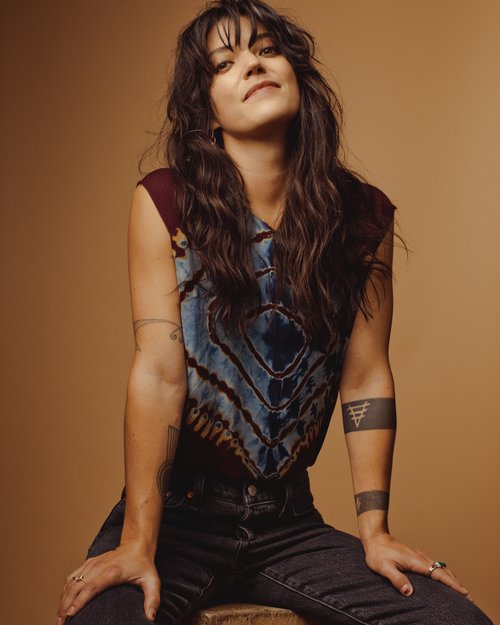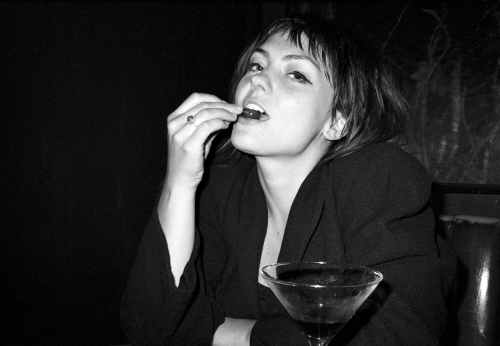
Join Sharon, Angel, and Julien as they head across the country with their bands for three very special individual sets of music on The Wild Hearts Tour. Special guest Spencer. will be opening the evening. These summer time shows will be full nights of music and a true experience from beginning to end.
The Wild Hearts Tour has partnered with PLUS1 so that $1 per ticket goes to supporting A New Way of Life Reentry Project and their work to advance multi-dimensional solutions to the effects of incarceration.
Sharon Van Etten
Sharon Van Etten’s Remind Me Tomorrow comes four years after Are We There, and reckons with the life that gets lived when you put off the small and inevitable maintenance in favor of something more present. Throughout Remind Me Tomorrow, Sharon Van Etten veers towards the driving, dark glimmer moods that have illuminated the edges of her music and pursues them full force. With curling low vocals and brave intimacy, Remind Me Tomorrow is an ambitious album that provokes our most sensitive impulses: reckless affections, spirited nurturing, and tender courage.
“I wrote this record while going to school, pregnant, after taking the OA audition,” says Van Etten. “I met Katherine Dieckmann while I was in school and writing for her film. She’s a true New Yorker who has lived in her rent controlled west village apartment for over 30 years. Her husband lives across the hall. They raised two kids this way. When I expressed concern about raising a child as an artist in New York City, she said ‘you’re going to be fine. Your kids are going to be fucking fine. If you have the right partner, you’ll figure it out together.’” Van Etten goes on, “I want to be a mom, a singer, an actress, go to school, but yeah, I have a stain on my shirt, oatmeal in my hair and I feel like a mess, but I’m here. Doing it. This record is about pursuing your passions.” The reality is Remind Me Tomorrow was written in stolen time: in scraps of hours wedged between myriad endeavors — Van Etten guest-starred in The OA, and brought her music onstage in David Lynch’s revival of Twin Peaks. Off-screen, she wrote her first score for Katherine Dieckmann’s movie Strange Weather and the closing title song for Tig Notaro’s show Tig. She goes on, “The album title makes me giggle. It occurred to me one night when I, on autopilot, clicked ‘remind me tomorrow’ on the update window that pops up all the time on my computer. I hadn’t updated in months! And it’s the simplest of tasks!”
The songs on Remind Me Tomorrow have been transported from Van Etten’s original demos through John Congleton’s arrangement. Congleton helped flip the signature Sharon Van Etten ratio, making the album more energetic-upbeat than minimal-meditative. “I was feeling overwhelmed. I couldn’t let go of my recordings – I needed to step back and work with a producer.” She continues, “I tracked two songs as a trial run with John [Jupiter 4 and Memorial Day]. I gave him Suicide, Portishead, and Nick Cave’s Skeleton Tree as references and he got excited. I knew we had to work together. It gave me the perspective I needed. It’s going to be challenging for people in a good way.” The songs are as resonating as ever, the themes are still an honest and subtle approach to love and longing, but Congleton has plucked out new idiosyncrasies from Van Etten’s sound.
For Remind Me Tomorrow, Van Etten put down the guitar. When she was writing the score for Strange Weather her reference was Ry Cooder, so she was playing her guitar constantly and getting either bored or getting writer’s block. At the time, she was sharing a studio space with someone who had a synthesizer and an organ, and she wrote on piano at home, so she naturally gravitated to keys when not working on the score – to clear her mind. Remind Me Tomorrow shows this magnetism towards new instruments: piano keys that churn, deep drones, distinctive sharp drums. It was “reverb universe” she says of the writing. There are intense synths, a propulsive organ, a distorted harmonium.
The demo version of “Comeback Kid” was originally a piano ballad, but driven by Van Etten’s assertion that she “didn’t want it to be pretty”, it evolved into a menacing anthem. Cavernous drones pull the freight for “Memorial Day,” which fleshes out an introvert in warrior mode. The spangled “Seventeen” began as a Lucinda Williams-esque dirge but wound up more of a nod to Bruce Springsteen, exploring gentrification and generational patience. Van Etten shows the chain reaction, of moving to a city bright-eyed and hearing the elders complain about the city changing, and then being around long enough to know what they were talking about. She wrote the song semi-inter-generationally with Kate Davis, who sang on a demo version when the song was in its infancy.
Since her last album, Van Etten has had a young son, and family life is joyful. Preparing and finishing these songs, she found herself expressing deep doubts about the world around him, and a complicated need to present a bright future for him. “There is a tear welling up in the back of my eye as I’m singing these love songs,” she says, “I am trying to be positive. There is strength to them. It’s— I wouldn’t say it’s a mask, but it’s what the parents have to do to make their kid feel safe.”
Alongside working on Remind Me Tomorrow, Van Etten has been exploring her talents (musical, emotional, otherwise) down other paths. She’s continuing to act, to write scores and soundtrack contributions, and she’s returning to school for psychology. The breadth of these passions, of new careers and projects and lifelong roles, have inflected Remind Me Tomorrow with a wise sense of a warped-time perspective. This is the tension that arches over the album, fusing a pained attentive realism and radiant lightness about new love.

Angel Olsen
The descent into darkness is a trope we find time again across history, literature and film — a protagonist plunging further and further into the depths. But there is also an abyss above. There is a winding white staircase that goes ever upward into the great unknown — each step, each turn, requiring a greater boldness and confidence than the one before. This is the journey on which we find Angel Olsen.
Olsen’s flight is both upward and inward. Olsen’s artistic beginnings as a collaborator shifted seamlessly to her magnificent, cryptic-to-cosmic solo work, and then she formed bands to play her songs, and her stages and audiences grew exponentially. But all along, Olsen was more concerned with a different kind of path, and on her vulnerable, Big Mood new album, All Mirrors, we can see her taking an introspective deep dive towards internal destinations and revelations. In the process of making this album, she found a new sound and voice, a blast of fury mixed with hard won self-acceptance.
“I guess you could say some bold and unexpected things have happened in my life” Olsen said. “It feels like part of my writing has come back from the past, and another part of it was waiting to exist.”
All Mirrors gets its claws into you on both micro and macro levels. Of course, there’s that singular vibrato, always so very close — seemingly simple, cooed phrases expand into massive ideas about the inability to love and universal loneliness. And then suddenly — huge string arrangements and four horsemen bellowing synth swells emerge, propelling the apocalyptic tenor. Throughout All Mirrors, Angel fully lets in the goth tones that always lurked at the ends of her song craft.
“In every way —from the making of it, to the words, to how I feel moving forward— this record is about owning up to your darkest side,” Olsen said. “Finding the capacity for new love and trusting change, even when you feel like a stranger. This is a record about facing yourself and learning to forgive what you see. It is about losing empathy, trust, love for destructive people. It is about walking away from the noise and realizing that you can have solitude and peace in your own thoughts, that your thoughts alone can be just as valid, if not more.”
The first step of All Mirrors, was conceiving a back-to-basics solo record, which she recorded with producer Michael Harris in Anacortes, Washington. Soon after that was completed, a more ambitious version of the album began to percolate in her mind. This second, more maximalist version of All Mirrors evolved slowly with producer John Congleton, arranger Jherek Bischoff, Swiss Army Knife musician/arranger Ben Babbitt, and a 14 piece orchestra.
“I was determined to keep it bare bones in order to contrast with the not yet recorded full band record,” Olsen said. “I wanted to have versions of these songs that are completely raw and real in the way some of my earlier recordings are, so that I could have the choice to play alone or with a band.”
While remaking the album with full production and new collaborators, Olsen developed a new relationship with control. And in that process, she developed an even clearer vision of herself as an artist.
“It’s scary to be your own compass, to trust new faces, to be a stranger — but sometimes that’s the only way forward,” she said. “When you’ve been in a repetitive cycle so long it’s difficult for anyone to see you as someone who could come out of it. When you’ve made an example of yourself that people expect, some voices remind you of that example even when you know in your heart you’ve made changes.”
“As I see it, in order for an artist to survive some kind of change, change needs to be a constant. For myself that constant change means having some kind of epiphany or clarity expressed in song. I don’t know if it’s something I inspire or attract, or if it’s just in the way I’m looking at my surroundings, but drama is something that surrounds my world and always has. I’m at least happy that I’ve learned to write it down.

Julien Baker
Julien Baker’s solo debut, Sprained Ankle, was one of the most widely acclaimed works of 2015. The album, recorded by an 18-year-old and her friend in only a few days, was a bleak yet hopeful, intimate document of staggering experiences and grace, centered entirely around Baker’s voice, guitar, and unblinking honesty. Sprained Ankle appeared on year-end lists everywhere from NPR Music to The AV Club to New York Magazine’s Vulture.
With Turn Out The Lights, the now 21-year-old Baker returns to a much bigger stage, but with the same core of breathtaking vulnerability and resilience. From its opening moments — when her chiming, evocative melody is accompanied by swells of strings — Turn Out The Lights throws open the doors to the world without sacrificing the intimacy that has become a hallmark of her songs. The album explores how people live and come to terms with their internal conflict, and the alternately shattering and redemptive ways these struggles play out in relationships. Baker casts an unflinching and accepting eye on the duality of – and contradictions in – the human experience, at times even finding humor and joy in the midst of suffering. She ultimately calls on her listeners to move beyond “good” and “bad,” or “happy” and “sad,” to embrace more complex truths.
The album was recorded at the legendary Ardent Studios in her hometown of Memphis, TN, and mixed by Craig Silvey (The National, Florence & the Machine, Arcade Fire). This evolution from Sprained Ankle’s intentionally spare production allowed greater scope and freedom for Baker, who is still the album’s sole writer and producer. Strings and woodwinds now shade the corners of her compositions, and Baker takes to piano rather than guitar on several tracks. In songs like the epic “Claws In Your Back,” these new textures push Baker’s work to cinematic heights of intensity.
As always, the real draw is her songwriting and lyricism. Turn Out The Lights is more expansive in sound and vision than Sprained Ankle and illustrates significant growth, yet the album retains the haunting delicacy of her heartbreakingly confessional style. Where her debut focused inward on Baker’s life and aspects of her identity (female, queer, Christian), Turn Out The Lights reflects on not only her own experiences, but also the experiences of those closest to her. The result finds Baker narrating a deliberate meditation on how we each try to deal with our ever-shifting mental health, and the impact this can have on both ourselves and others. The album sets out to address how the process of coping with internal conflicts affects different relationships – romantic, familial, and friendly. Baker turns outward to embrace the challenges of the human experience, weaving personal struggles together into one surprisingly hopeful chorus.
The album is bookended by “Appointments” and “Claws in Your Back,” two songs that deal with the precarious balance between nihilism and realism. “A lot of stuff happened in my life that was rapid change, and it felt like it could not get any worse,” Baker says of “Appointments.” “I was like, I have reached critical mass for this amoeba of sadness and it cannot possibly turn out all right. But for the sake of my continuing to exist, I have to believe that it will.”
The resulting song (“I think if I ruin this, then I know I can live with it,” Baker sings) cuts to the core of Baker’s uniquely clear-eyed take on human suffering. She resists facile conclusions and never glamorizes the extremes she depicts; yet she continually holds out the possibility of joy and solidarity. On “Claws In Your Back,” she turns her own hard-won determination to thrive into a rallying cry for her friends (“I think I can love the sickness you made. I take it all back, I change my mind. I wanted to stay”).
Even as Turn Out The Lights explores broken relationships (“Sour Breath”), the search for a cure that may not exist (“Everything To Help You Sleep”), and the impossibility of ever truly understanding each other (“Shadowboxing”), Baker continually returns to the possibility of joy. “I don’t believe in the ‘fixing’ part, where what healing means is that you no longer get sad or experience grief or have panic attacks,” Baker says. “Happy is kind of a fleeting and transient emotion. It is not a destination that you can get to by exerting enough mental effort. I believe that joy is something that you can invite into your present circumstance. Whereas happiness seems to be this horizon that’s eternally getting further from you, joy is something that you can inhabit.”
It’s this call to joy even in moments of otherwise total darkness that makes her music a refuge for her fans. Turn Out The Lights is ultimately a healing experience, and it’s impossible not to feel Baker’s unyielding compassion for the messy and beautiful human experience. “When I talk about things in myself I find ugly and unlovable, they are the most effective tools for connecting with other people, for helping other people heal,” she says. “And that helps me heal.”

Quinn Christopherson
Quinn Christopherson is an Ahtna Athabascan and Iñupiaq songwriter, born, raised, and based in Anchorage, Alaska.



